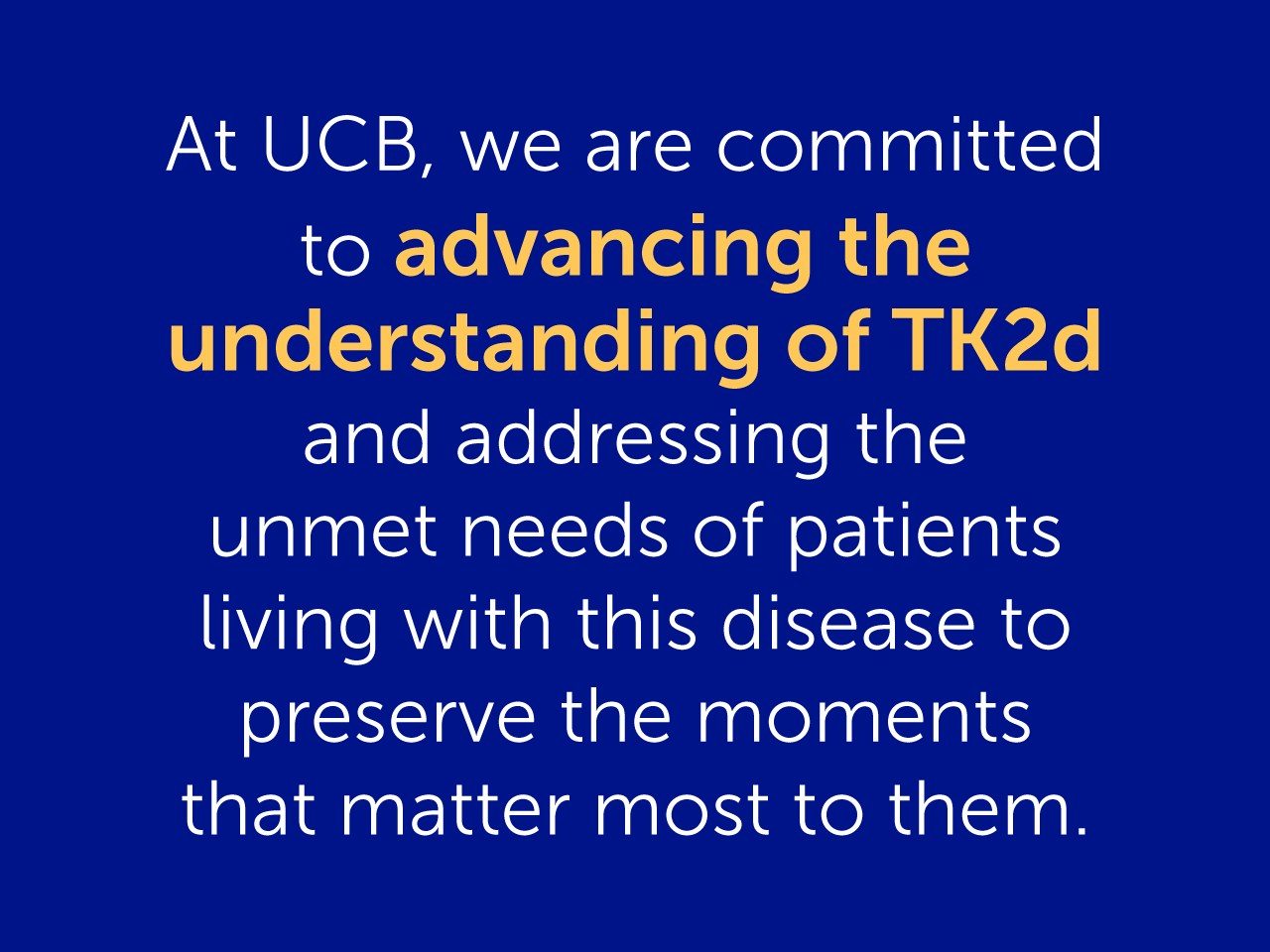
UCB is driven by patient value, not patient numbers. This is especially the case for ultra rare diseases.
What is Thymidine Kinase 2 Deficiency?
TK2d is a debilitating and life-threatening genetic disease that causes progressive and severe muscle weakness.1,2,3,4 The prevalence of TK2d itself is still being researched.
How does TK2d impact patients?
TK2d can manifest in different ways and affect different parts of the body1,2,3, including the muscles, lungs, nervous system, eyes, and gastrointestinal.
How is TK2d diagnosed and treated?
There are no health-authority-approved therapies currently available. Patients require medical equipment and therapies such as respiratory support, feeding tubes, wheelchairs, respiratory physiotherapy, and physical therapy.1,3,5 Genetic testing is necessary for a TK2d diagnosis.
We are proud to contribute to advancing in the understanding of TK2d and are committed to continuing our mission to address unmet patient needs for patients living with this disease.
References
- Garone C, Taylor RW, Nascimento A, et al. Retrospective natural history of thymidine kinase 2 deficiency. J Med
- Genet. 2018;55(8):515-21. 2 Wang J, Kim E, Dai H, et al. Clinical and molecular spectrum of thymidine kinase 2-related
- mtDNA maintenance defect. Mol Genet Metab. 2018;124:124-30. 3 Domínguez-González C, Hernández-Laín A, Rivas E, et al. Late-onset thymidine kinase 2 deficiency: a review of 18 cases. Orphanet J Rare Dis. 2019;14(1):100.
- NationalInstitute of Health. TK2-related mitochondrial DNA depletion syndrome, myopathic form. https://medlineplus.gov/genetics/condition/tk2-related-mitochondrial-dna-depletion-syndrome-myopathic-form/#genes. Last on January 2023.
- El-Hattab AW and Scaglia F. Mitochondrial DNA depletion syndromes: review and updates of genetic basis, manifestations, and therapeutic options. Neurotherapeutics. 2013;10:186-98
Choose Country
- Global Site – English
- Australia – English
- België – Engels
- Belgique – Anglais
- Brasil – Português
- България – Български
- Canada – English
- Canada – Français
- 中国 – 中文
- Česká Republika – Angličtina
- Danmark – Engelsk
- Deutschland – Deutsch
- France – Français
- España – Español
- Ελλάδα – Ελληνικά
- India – English
- Ireland – English
- Italia – Inglese
- 日本 – 日本語
- Казахстан – ағылшын тілі
- 한국 – 한국어
- Luxembourg – Anglais
- Luxemburg – Engels
- Magyarország – Angol
- México & Latinoamérica – Español
- Nederland – Engels
- New Zeeland – English
- Norge – Engelsk
- Österreich – Deutsch
- Polska – Polski
- Portugal – Inglês
- România – Engleză
- Россия – Русский
- Slovensko – Anglický
- Suomi – Englanti
- Sverige – Engelska
- Schweiz – Deutsch
- Suisse – Français
- Türkiye – Türkçe
- Україна – Англійська
- United Kingdom – English
- U.S.A. – English


